Alderney is a small island with many beautiful flowers, especially in spring and summer. This blog introduces you to some botanical beauties you may encounter on a walk in Alderney during late spring and summer (June–August)
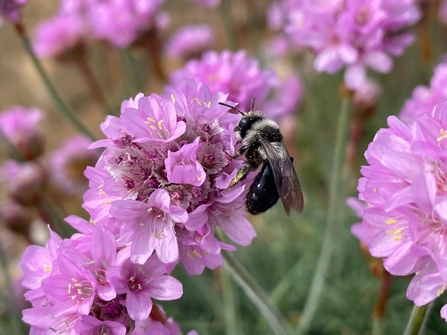
Ash mining bee on Thrift / Thanh Doan
Thrift (Armeria maritima)
Also known as Sea Pink, Thrift is common all around Alderney’s coasts and cliffs and can be found in flower in sheltered places most months of the year. Its pom-poms of flowers can vary between deep pink to almost white and are very attractive to many pollinators.
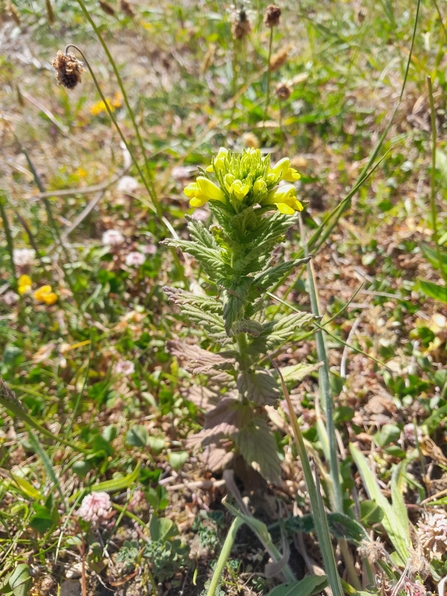
Yellow Bartsia / Lindsay Pyne
Yellow Bartsia
Yellow Bartsia (Parentucellia viscosa) is an erect hairy plant that flowers between June and September. It bears bright yellow flowers which are arranged in spikes.
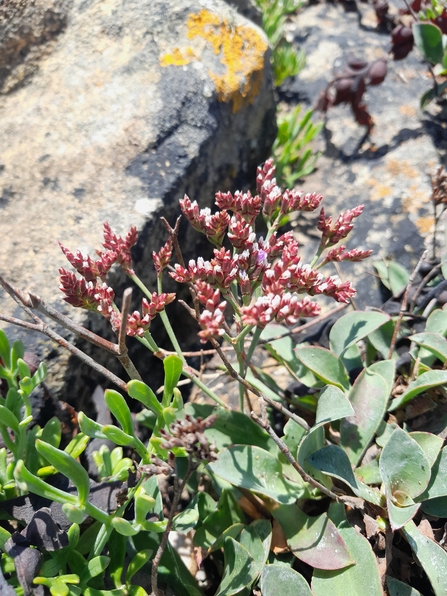
Alderney Sea-lavender / Lindsay Pyne
Alderney Sea-lavender (Limonium normannicum)
Alderney Sea Lavender is one of the island’s special plants as in the whole of the British Isles it only grows here and in Jersey. On Alderney, it grows on the rocky splash zone at Houmet Herbe, and is in flower from late May to August. You may also find the more common Rock Sea-lavender on the shore nearby.
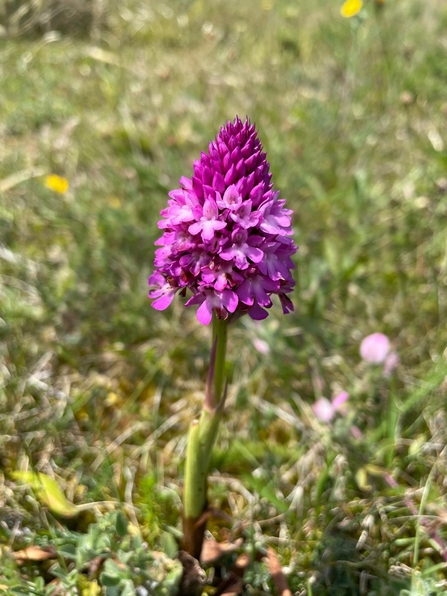
Pyramidal Orchid / Thanh Doan
Pyramidal Orchid (Anacamptis pyramidalis)
This is Alderney’s commonest orchid. It has a pyramid-shaped head of bright pink flowers, each with a long spur, and narrow unspotted leaves. It can be found in calcareous grassland and along road verges from June and Braye and Longis Commons are particularly good places to see it.
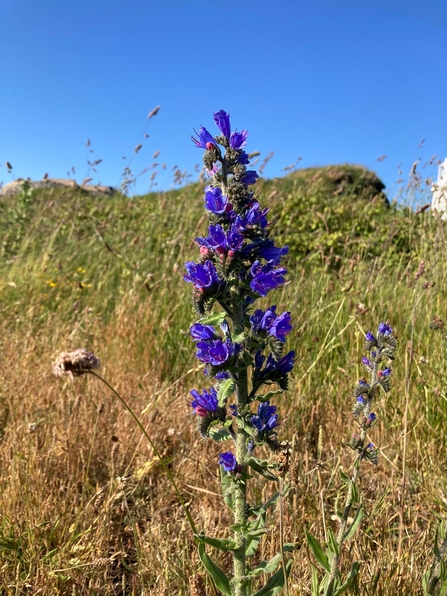
Viper's Bugloss / Poppy Emmens
Viper’s Bugloss (Echium vulgare)
A roughly hairy native biennial, it produces spikes of brilliant blue trumpet-shaped flowers with pinkish-purple protruding stamens. It prefers dry, bare or sparsely grassy places, and one of the best places to find it here is around Fort Albert. The plant is loved by insects of all kinds, especially bees, hoverflies and butterflies.
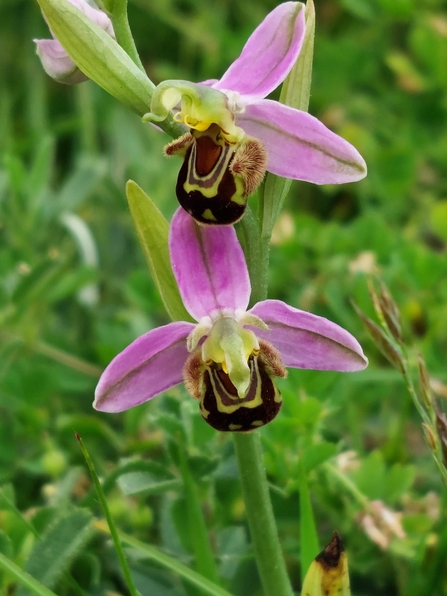
Bee Orchid / Lou Collings
Bee orchid (Ophrys apifera)
This orchid resembles a female bee—a clever trick to attract bees for pollination. However, the right species of bee does not occur in the UK, so bee orchids are self-pollinated. They can be found in chalky grasslands such as Braye Common and the area near the Harbour.
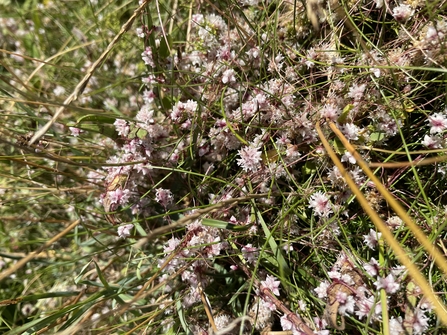
Dodder in flower / Thanh Doan
Dodder (Cuscuta epithymum)
A small parasitic plant containing no chlorophyll, Dodder appears as a mass of tiny red strings all over its host plant, usually Thyme, Gorse or Bird’s-foot Trefoil. Little pale pink flowers, resembling miniature pom-poms, appear in the summer. Dodder is considered vulnerable in the UK but is locally common on Alderney, particularly within the Longis Reserve.
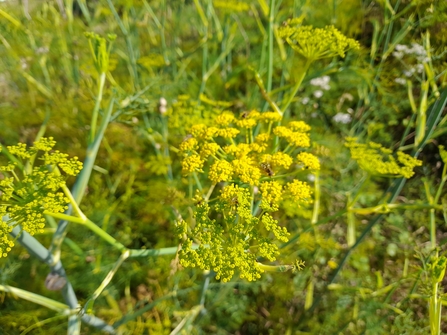
Fennel / Thanh Doan
Fennel (Foeniculum vulgare)
Fennel is a naturalised species, usually found here by the sea and around the coast in places such as Platte Saline and Braye Common. The flat umbels of yellow flowers appear in July and the fine dark green feathery leaves with their strong aniseed smell (and taste) are an excellent addition to local fish dishes.
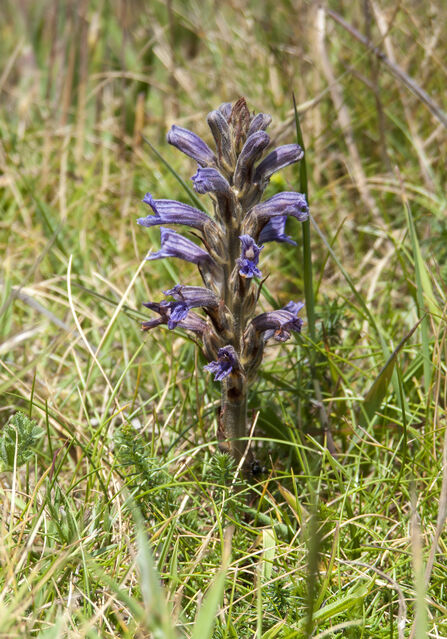
Yarrow Broomrape / AWT staff
Yarrow Broomrape (Orobanche purpurea)
It’s a parasite of the Yarrow’s roots, but whilst it is rare in Guernsey and the UK, it is relatively common on Alderney. It has purple flowers and is found from late May in coastal grasslands such as Braye and Longis Commons.
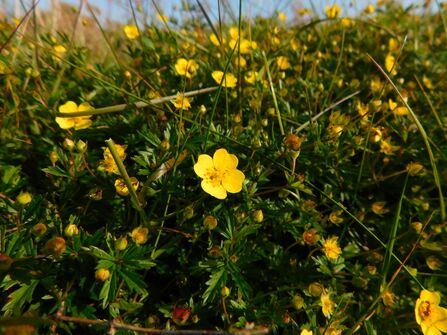
Tormentil / Poppy Emmens
Tormentil
Tormentil (Potentilla erecta) can be found growing on acid grassland and heathland but even pops up alongside roads. It bears yellow, buttercup-like flowers, but with only four petals (buttercups have five).
Yellow-horned Poppy
Yellow-horned Poppy
(Glaucium flavum)
A strand-line speciality, the Yellow-horned Poppy has four beautiful silky yellow petals. These quickly drop but the plant produces a new flower each day from the long, curved, horn-like seed pods which develop.
Red campion / Lindsay Pyne
Red Campion (Silene dioica)
This native plant can be found throughout the year in both wet and dry, wooded and coastal habitats. It has scentless deeply notched five-petalled flowers which are usually deep pinky-red but may also be pale pink or white.
Borage / Lindsay Pyne
Borage (Borago officinalis)
Borage (also known as starflower or bee bush) is a bristly annual herb commonly found in cultivated fields, disturbed verges, and waste areas. It blooms between May and September, thriving in sunny conditions and exhibiting exceptional drought tolerance. Its young leaves are edible and the flowers can be used as a garnish for drinks and desserts.
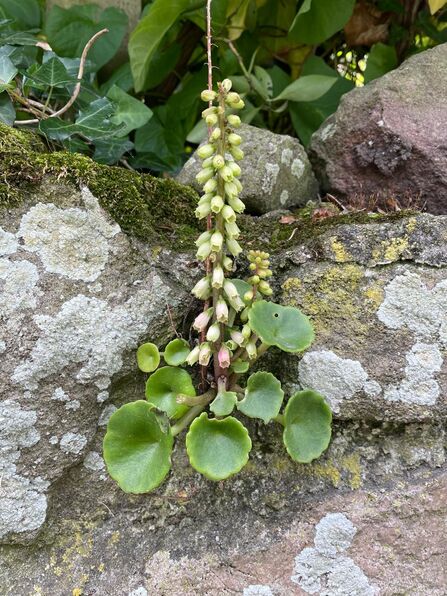
Wall pennywort (Navelwort) / Thanh Doan
Wall Pennywort, also known as Navelwort (Umbilicus rupestris)
This is a curious looking plant with a spike of bell-shaped greenish pink flowers and round leaves with a dimple in the centre. It usually grows on walls or in rock crevices and is a common sight along Alderney’s south cliffs. The photo was taken on La Marette Road.
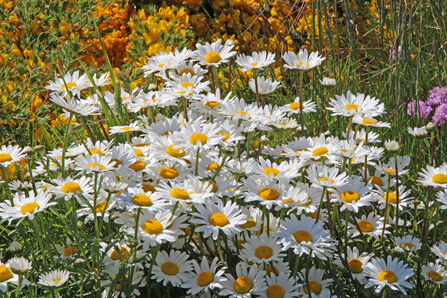
Ox-eye daisy / Bill Black
Ox-eye Daisy (Leucanthemum vulgare)
Often found in grasslands, it is Britain's largest native member of the daisy family and can be found in flower all around Alderney's coast and cliffs from late spring.
Autumn squill / Lindsay Pyne
Autumn Squill (Scilly autumnalis)
The short upright spikes of blue-purple - occasionally white - flowers can be seen in mid-summer primarily in short dry grassland. The plant is nationally scarce, but here it is locally common – look out for it around the lighthouse and the east and south coastal paths.
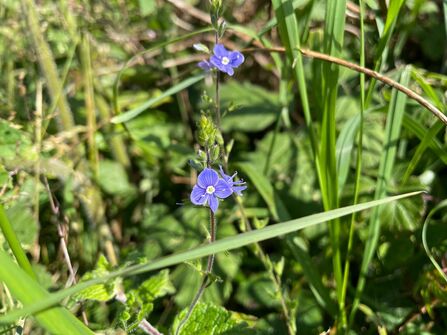
Germander speedwell / Thanh Doan
Germander speedwell
(Veronica chamaedrys)
Considered a good luck charm for travellers, the bright blue flowers of Germander speedwell are meant to 'speed' you on your way. This reputation may well have come about because of its habit of forming large clumps in hedgerows, roadside verges and grassy lanes; it can also be found on grasslands and in open woodlands. The flowers appear from April to June. On Alderney, you can spot lots of Germander speedwell in the Community Woodland.
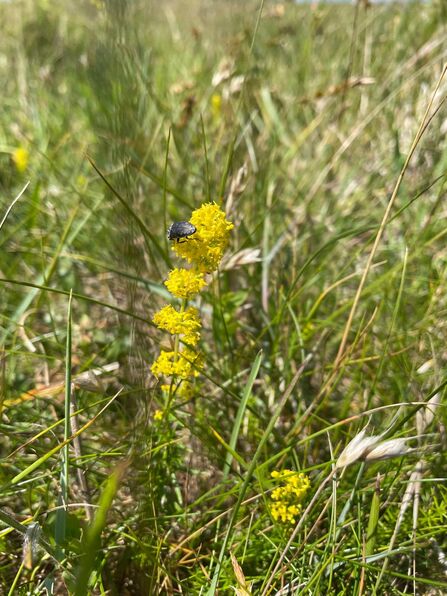
Lady's bedstraw / Thanh Doan
Lady’s Bedstraw (Galium verum)
The frothy, yellow flowers of lady's bedstraw scent the air with honey. The stems can be so dense with flowers that they carpet the grass with yellow from June to September. Dried, this flower has the scent of new-mown hay, and its name is probably derived from the tradition of stuffing straw mattresses with it, particularly those of women about to give birth. You can spot lots of Lady’s Bedstraw on Longis Common.
Red Valerian / Lindsay Pyne
Red Valerian (Centranthus ruber)
Despite its non-native status (it is of Mediterranean origin), this plant is a good source of nectar for bees, butterflies and moths. It has dense clusters of tiny crimson, pink or white flowers from May to October and is commonly found on Alderney often growing on old stone walls and embankments.
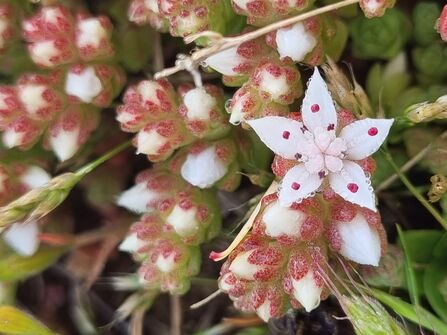
English stonecrop / Alex Purdie
English Stonecrop (Sedum anglicum)
English Stonecrop has lovely pinkish-white star-shaped flowers. It likes acidic soils and thrives in dry sunny places such as cliffs, rock crevices, walls and coastal grassland.
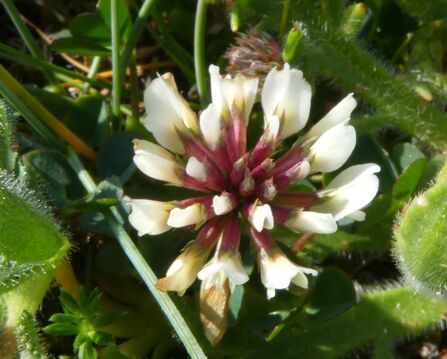
Western clover / Lindsay Pyne
Western Clover (Trifolium occidentale)
This plant is common in Alderney’s short coastal turf in early spring but is special as it is classed as nationally scarce. It is often mistaken for the more generally widespread White Clover; however, it is smaller and slenderer, with red tinged stipules and calyx, and the leaves are smaller and unmarked, without any white patterning.
Bird's-foot trefoil / AWT staff
Bird’s-foot Trefoil (Lotus corniculatus)
This plant forms colourful swathes across grasslands such as Longis and Platte Saline Commons from May onwards and is loved by butterflies such as the Common Blue. Its name derives from the seed pods which resemble the foot of a small bird, and it is also known as “Eggs & Bacon” because of its yellow and orangey-red colouration.

Sea holly / Bill Black
Sea Holly (Eryngium maritimum)
Sea Holly can be found in sandy places above the high tide line, with some of the best displays on Alderney being along Platte Saline. Its leaves are covered in a waxy cuticle to help the plant retain water and the stunning blue thistle-like flowers appear from July to September.
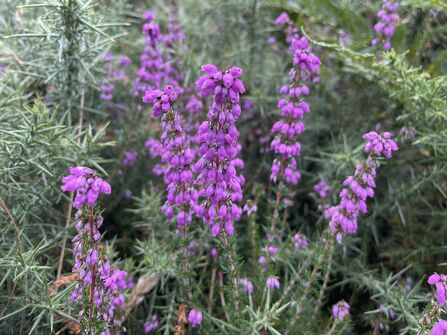
Bell heather / Thanh Doan
Bell Heather (Erica cinerea)
Bell heather is the first of Alderney’s heathers to flower, usually from May. It is a deeper purple than Ling and has larger bell-shaped flowers. You can spot lots of bell heather on your walk in Vau du Saou
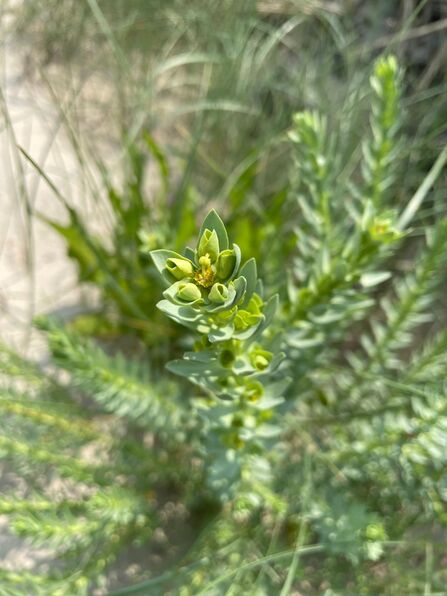
sea splurge / Thanh Doan
Sea Spurge (Euphorbia paralias)
Sea Spurge can be found on sand dunes and the upper parts of many of Alderneys’ beaches, particularly Platte Saline, Braye and Arch. It has a cluster of curiously shaped yellowish-green cup-like flowers at the end each single stem and fleshy leaves to help the plant retain water in the arid conditions in which it thrives.
Kidney vetch
Kidney Vetch (Anthyllis vulneraria)
This coastal plant is important because of its value for many species of insects. It has round clusters of flowers that are mainly yellow, but can also be orange and red, and each flower has its own hairy calyx giving it a woolly appearance. It can be found all around the island from late April.
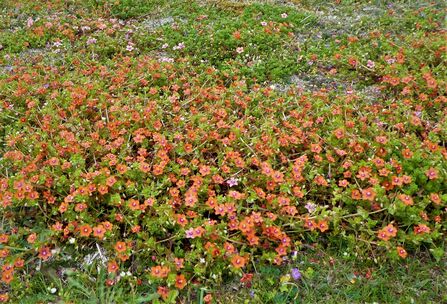
scarlet pimpernel / Bill Black
Scarlet Pimpernel (Anagallis arvensis)
A very common plant, often growing side by side with Wild Thyme and Bird’s-foot Trefoil, Scarlet Pimpernel can vary in colour from the typical red to pale pink, purple and even, very occasionally, blue. It is sometimes called “Poor Man’s Weather Glass” as the flower remains closed in cloudy weather.
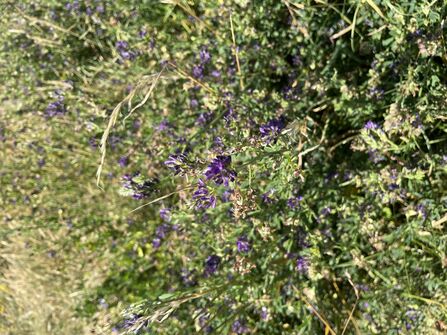
Lucerne / Thanh Doan
Lucerne (also known as Alfalfa) (Medicago sativa)
Lucerne was introduced to the UK as a crop to feed livestock and improve soil fertility in the seventeenth century. The name 'Lucerne' means 'bright seeds' and the name 'Alfalfa' means 'fresh fodder'. Lucerne is a bushy plant, growing to about a metre and makes good fodder as it has a high protein content. It has a dull-green appearance owing to downy hairs covering its leaves and stems. The flowers are purple or lilac and arranged into globular clusters on compound flowerheads.
Yarrow / Lindsay Pyne
Yarrow (Achillea millefolium)
Yarrow is a common sight all around the island in coastal grasslands, and even in gardens, from late June onwards. Although the flat-topped flower heads are usually white you can sometimes find plants with striking pink/purplish flowers, and the dark green feathery leaves can be used as an infusion.

